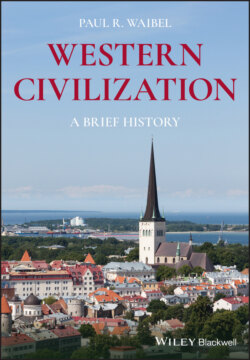Читать книгу Western Civilization - Paul R. Waibel - Страница 54
Feudalism
ОглавлениеAfter the collapse of Charlemagne's empire, there was no longer a central government and no great warrior like Charlemagne to defend Christendom from the new invaders. As one chronicler put it, “Once we had a king, now we have kinglets” (Dowley 2018, p. 140). Or as another said in 909, “every man does what seems good in his own eyes, despising laws human and divine and the commands of the Church. The strong oppress the weak; the world is full of violence against the poor and of the plunder of ecclesiastical goods” (Bokenkotter 2005, p. 112). In the midst of the chaos, a system known generally as feudalism evolved to provide for law and order and economic livelihood at the grassroots level.
In attempting to describe feudalism, one is forced to describe it in theory, since it evolved over several centuries and differed from place to place and from time to time. It is doubtful that feudalism in practice ever fully reflected feudalism in theory. The highly centralized version introduced in England following the Norman Conquest in 1066 is probably the closest practice ever came to approximating theory.
The political, economic, and social order of medieval Europe is referred to by the generic term “feudalism.” A distinction is made between the governmental side of feudalism and the economic side of feudalism. The governmental side is referred to as the feudal system, and the economic side is referred to as the manorial system.
Medieval society divided people into two classes – nobles and commoners. The emergence during the late Middle Ages of a third class, the middle class (bourgeoisie), which could not be fitted into feudalism, was a leading cause of its slow decline. The feudal system involved only the members of the nobility, and had to do with the relationship between lord and vassal. The manorial system involved both the nobility and the commoner, and had to do with the relationship between the lord of the manor and the commoners (serfs, peasants, villeins, yeomen) who lived on the manor and worked the land.
